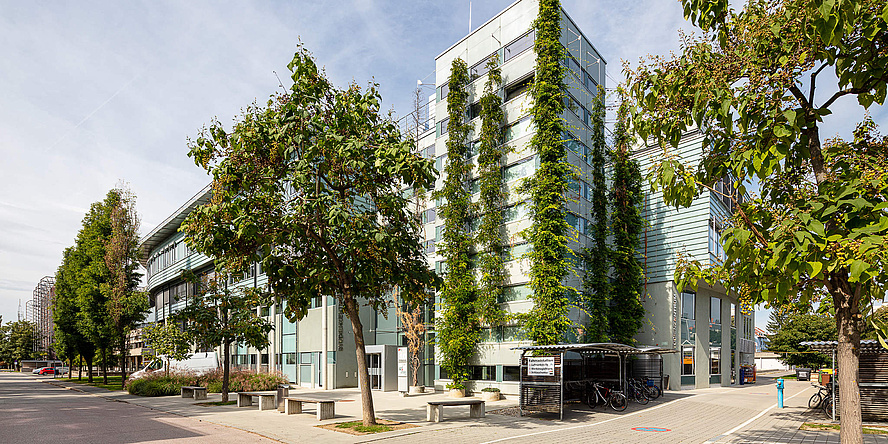Civil engineers plan and build structures and maintain them. Their field of activity ranges from buildings such as residential or commercial properties to transport infrastructure such as roads or railway networks. Civil engineers also create the structural basis for supplying our cities and settlements with water and energy. Not to forget protective structures, for example for flood protection, which are gaining in importance in view of the increasing frequency of extreme weather events. Few training programmes offer such a wide range of fields of application as the study of civil engineering.
“When we talk about civil engineering, we are talking about the built environment, – what we as humans design when we interfere with nature – to construct buildings and infrastructure that we need as a society to meet our protection and mobility needs and our energy needs. The sustainable and climate-friendly design of the built environment is a key task for future civil engineers.” (Michael Monsberger, Dean of Studies for Civil Engineering at TU Graz)
Civil engineers are in demand
Accordingly, there is a wide range of possibilities in which graduates can pursue the profession – and they are in high demand nationally and internationally. “On the one hand, construction is always a local business. Construction, renovation and maintenance of buildings and infrastructure is done on site and requires manpower. In Austria in particular, there are many existing buildings, such as Gründerzeit buildings (translator’s note: buildings of the construction boom in the second half of the 19th century) in cities and existing transport infrastructure, that need to be preserved. On the other hand, there are large-scale construction projects all over the world. Specialists from Austria have a great deal of expertise in hydropower plant construction or tunnel construction, for example, which is not only in demand locally but also in international projects,” says Michael Monsberger, Dean of Studies for Civil Engineering at TU Graz, outlining the situation. “There is a lot of new construction going on in countries outside Europe today. After graduation, many students take the opportunity to work for internationally operating companies and see the world. After that, there is always the possibility to come back.”
Where civil engineers work: an overview
Civil engineers work
-
In the construction planning sector. For example, conception, design and layout of structures is carried out in offices for structural planning or building physics. Here, with the appropriate professional experience, there is the opportunity to set up a company yourself, for example as a civil engineer. After completing the Master’s degree, three years of professional experience and a special examination at the Chamber of Civil Engineers are required. International careers are also possible in the planning industry.
-
In executing construction. In an implementing company, usually a classic construction company, graduates work in management, calculation, or specific technical and organizational execution. Career opportunities extend all the way to the executive floors of international companies.
-
With investors and public and private clients. Graduates are involved in the basic project conception, develop the economic and technical basis for investment decisions and supervise, control and monitor projects as representatives of the client.
-
In the public sector. Experts in public authorities, for example, create the regulatory framework for the building industry.
What qualities should students bring with them?
“Anyone who wants to study civil engineering should have a joy of designing and a basic interest in technology,” Monsberger explains. In the Bachelor’s programme Civil Engineering Sciences and Contruction Management students learn the basics and thus acquire a broad basic knowledge.
In the Bachelor’s programme in Civil Engineering Sciences and Construction Management at TU Graz, students learn engineering fundamentals such as mathematics and descriptive geometry, physics and mechanics and structural analysis. And they gain a cross-sectional knowledge in computer science, building management, fundamentals of structural engineering, environment and transport, hydraulic engineering and geotechnics.
In the Master’s programme, specialization takes place in the various sub-areas – depending on interests and talents.
If someone’s strengths lie in the area of organization and economics, the student can delve into the construction industry and deal with the organization and handling of construction projects in terms of construction economics and construction management. If someone is more interested in the technical aspect, they can work towards shaping the realization and implementation of buildings from the technical side. A classic civil engineering topic is the calculation of static load so that the structure does not collapse, as is also the choice and use of building materials. Anyone with a special interest in building physics deals with issues relating to heat, moisture, sound insulation and room acoustics in buildings. TU Graz graduate Theresa Reif, for example, works in a civil engineering firm in the field of building physics on numerous renovation projects as well as on small and large new construction projects. “I’m involved from the design stage through to completion, creating simulations, for example on heating loads or the avoidance of overheating in summer, and answering questions on building physics for planners, awarding authorities and contractors,” says the East Tyrolian, describing her day-to-day work.
Anyone who wants to become self-employed in Austria with a Master’s degree in architecture or civil engineering takes the civil engineer examination at the Chamber of Civil Engineers after three years of professional experience.

Theresa Reif measures the moisture content of the existing masonry as part of a renovation project. Numerous laboratory exercises and field tests are already part of the civil engineering training in the Bachelor’s degree programme. © Pilz & Partner ZT GmbH
Differences between civil engineering and architecture
In contrast to TU Graz student Lena Brigitte Mahringer, who wanted to work in the construction industry even as a child, Theresa Reif’s path after secondary school initially led her to study architecture. After completing her Bachelor’s degree, she worked part-time in an architectural firm and discovered her love of civil engineering topics there. “I then enrolled in the Bachelor’s programme in Civil Engineering Sciences and Construction Management, worked part-time for a civil engineer and put my Master’s in architecture on hold. In the meantime, I have completed my Master’s degree in Civil Engineering and Structural Engineering AND am currently finishing my architecture degree.” While architects primarily devise and design buildings in an artistic and creative way, civil engineers are primarily responsible for the specific implementation. However, architecture also builds on a basic knowledge of construction and materials technology – and conversely, the structural implementation also requires creativity. In practice, there are close points of contact. “In the planning phase, I sometimes work closely with architects and provide support especially in the detailed planning,” explains Reif. “What I particularly like about building physics is that there is a lot of scope for new methods and approaches and therefore also for creativity.”
Doing something for the environment as a civil engineer
This creativity is in demand today more than ever. The construction industry is a key contributor to the environmental impact of carbon dioxide, particularly through the production and use of building materials, as well as through the operation of buildings, which includes heating and cooling. Sustainable and energy-efficient construction methods are therefore key to achieving energy and climate goals.
If you are interested in building materials, you can find out more in the TU Graz news article “What is concrete?” to find out how sustainable concrete really is and can be. Wood as a building material is the subject of the article “Timber construction changes our cities”.
The way a building is constructed has a major influence on how much energy is consumed. This starts with the choice of materials and raw materials and also depends on their use. “My calculations have a decisive influence on the building envelope, and therefore also on its sustainability. It is also part of my responsibility to explain to awarding authorities what the so often used word “sustainability” means in individual cases – and what it does not mean,” Reif explains. “Certifications of existing buildings are also increasingly undertaken to assess their overall sustainability. Part of these assessments are done by civil engineers.”
Information on the civil engineering degree programme in Graz
Those who are interested in studying “Civil Engineering Sciences and Construction Management” in Graz, but are not yet sure, will find advice and guidance on all the study programmes at the Open Day at TU Graz which takes place annually in the week after Easter. Every year in autumn TU Graz hosts the Careers fair for the construction industry “BIT-BAU” for school and university students. One feature of civil engineering studies at TU Graz is the culture of the drawing studios. The Faculty provides spaces where students can study together in a self-organized way, exchange ideas and make social contacts. “I liked the way the students interacted with each other. People always tried to help each other, and that’s not automatic,” Theresa Reif recalls of her studies. Lena Brigitte Mahringer initially chose TU Graz because she immediately felt at home in Austria’s second largest city Graz with a population of around 280,000. An additional benefit was the TU Graz 100 scholarship, for which she applied as a good student and which helps her finance her studies.
Funding for study programmes. With 100 scholarships for Bachelor’s and Master’s students from various disciplines, TU Graz promotes young talents from Austria and abroad in cooperation with companies. In the framework of the TU Graz 100 programme, up to 100 scholarships per year are awarded for Bachelor’s and Master’s studies. You can find an overview of all the scholarships on the TU Graz website.
Play video
Video “Civil engineering: Hardly any other occupational field is so diverse and interdisciplinary”

